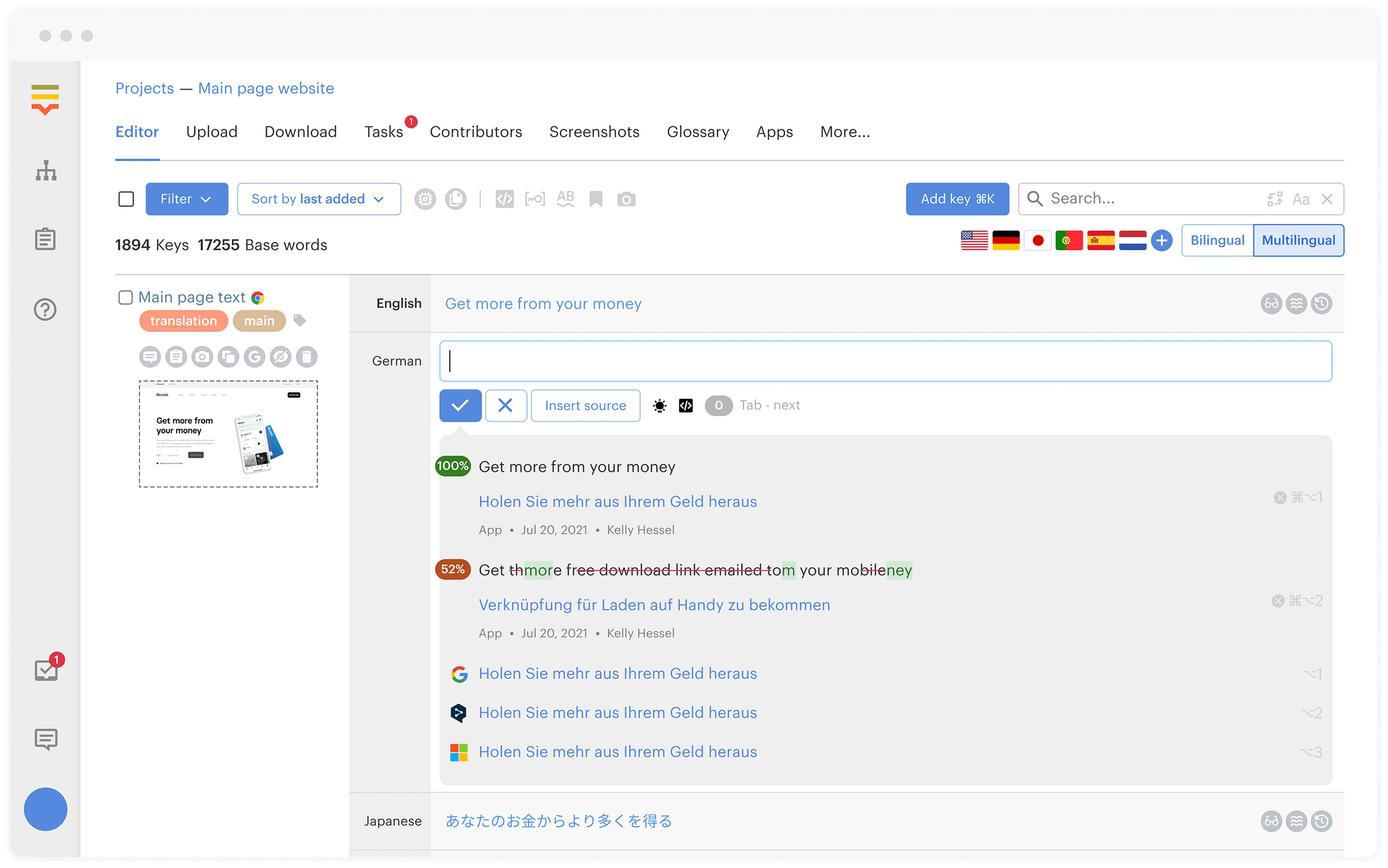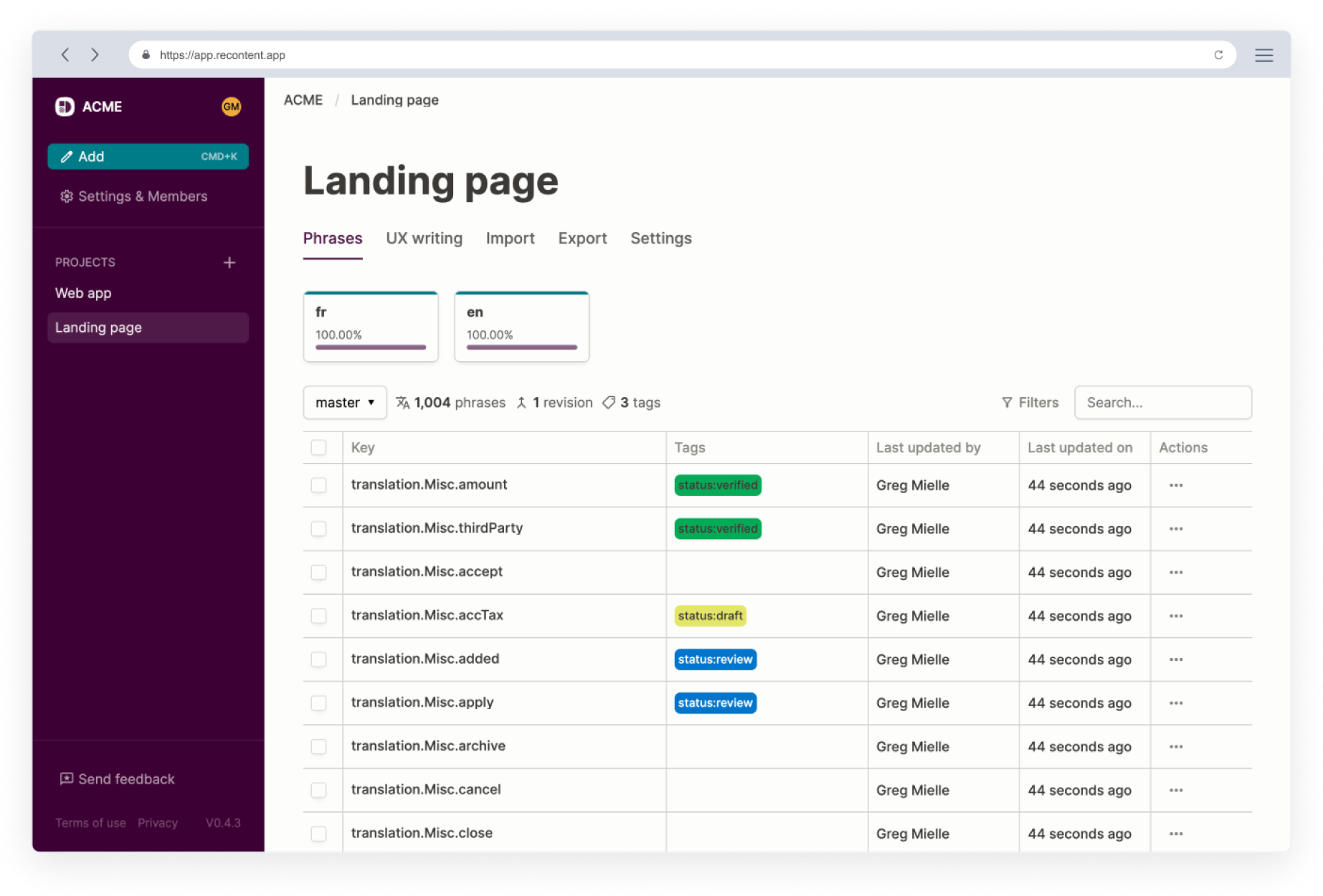Lokalise alternative: Recontent.app vs Lokalise
A non-exhaustive list of pros & cons of using Lokalise.com & why you might want to consider another solution.
If you’re developing a website, mobile application or any other software, chances are localization is one of your concerns. Wether your product is available in one or multiple languages, it’s hard for your team to maintain a coherent experience for your users if your content is hardcoded in the code.
With translation management systems (TMS) or product copy localization tools, you maintain a single source of truth which can be used in design tools, the code or anywhere else.
Let’s analyze Lokalise.com, define its strengths, weaknesses & potential alternatives to help you make an informed decision for your localization needs.
What makes Lokalise a great choice?
Lokalise has become a leading localization platform with its feature-rich platform & 3,000+ teams using it. Some of those features simplify & enhance a lot the translation workflow.
Quality assurance (QA) with the help of AI
One of Lokalise’s key strengths are their quality assurance features, allowing you to catch errors that might otherwise slip through the cracks.
With recent innovations around artificial intelligence (AI), QA is more accurate & saves even more valuable time & effort for your team.
- Automated Proofreading: The platform’s AI engine can automatically detect and flag common grammatical errors, typos, and inconsistencies in your translations.
- Translation Memory: Lokalise’s translation memory (TM) learns from your previous translations, suggesting the most accurate and consistent translations for repeated phrases and segments. This helps maintain consistency across your projects and reduces the likelihood of errors.
- Machine Translation: While not a replacement for human translators, Lokalise offers machine translation as a starting point for your translations. This can be particularly helpful for quickly understanding the gist of a text or for translating less critical content.
Collaboration with chained tasks & external reviewers
The localization process involves many team members, from design to code but also UX writing, managers, etc. Lokalise offers a range of features designed to facilitate seamless collaboration among teams and external contributors:
- Chained Tasks: Lokalise allows you to set up workflows with chained tasks, ensuring that each step in the localization process is completed in the correct order. For example, you can create a workflow where a translator works on a text segment, a reviewer checks the translation, and a proofreader gives the final approval, all within a structured and automated system.
- Review Center: Lokalise’s dedicated review center simplifies the review and approval process. Stakeholders can easily access translations, leave comments, suggest edits, and track the progress of each translation task. This centralized hub streamlines communication and ensures everyone is on the same page.
Lots of integrations & complete REST API
In many cases, exporting content as static files is not enough to integrate with an existing application or business. Lokalise exposes a set of tools to integrate with thirdparty softwares directly or through custom integrations with their public REST API.
- REST API: Lokalise’s API gives developers the flexibility to build custom integrations with their preferred tools, content management systems (CMS) or other applications.
- Code SDKs: Lokalise offers SDKs for various programming languages, including JavaScript, Python, PHP, and Ruby, making it easier for developers to interact with the platform programmatically.
What to consider before choosing Lokalise
While Lokalise offers a powerful set of features, there are some potential drawbacks to consider before fully committing to the platform.
Evaluating these potential downsides alongside your specific needs and budget constraints is crucial for making the best decision for your localization workflow.
Their pricing plans are expensive
Lokalise offers subscription plans with tiers based on the number of seats & keys. While their “Start” plan starts at $140/month ($120/month if paid annually), the bill can quickly increase for rapidly growing teams or organizations with specific needs.
-
Essential features are only for Pro & Enterprise: Lokalise’s pricing can be prohibitive for small to medium-sized startups. You’re a designer that wants to use a Figma plugin? $990/month. You need extra keys? $30/1,000 keys you add. Want to use Lokalise AI? It’s not included.
Even if you don’t need all the platform’s capabilities, accessing advanced features often requires opting for higher-tier plans.
-
Collaboration is limited by extra seats: While Lokalise boasts robust collaboration features, fully leveraging them often requires extra seats. If you’re a team of 20 including managers, designers & developers on an “Essential” plan, it costs $500/month ($270 + 10 extra seats * $27).
Of course you could ask all developers to log in using the same account but it would limit the effectiveness of these collaborative features, undermining their value proposition.
User interface & learning curve
While Lokalise is packed with features, its user interface can feel overwhelming, especially for new users unfamiliar with localization platforms.

- Steep learning curve: The platform’s extensive functionality can be a double-edged sword. Navigating the interface and mastering all its features can require a significant time investment, potentially slowing down your localization workflow, especially in the initial stages.
- Lack of intuitive design: Some users find that Lokalise’s editor lacks the intuitive design found in other platforms. Essential features might be buried in menus, requiring extra clicks and adding unnecessary complexity to simple tasks.
AI features: transparency & cost-effectiveness
While Lokalise promotes its AI-powered features, there are some aspects that warrant careful consideration:
- Opaque AI pricing: Lokalise’s AI features incur an additional cost, starting at $250/month for a limited number of translated words. Knowing that Lokalise AI is based on OpenAI’s GPT-4 — a commercially available large language model (LLM) priced at a fraction of this — one might question whether these AI costs can scale with your team’s growing use of AI and support your company’s growth.
- Data privacy concerns: Lokalise provides little information about the data or context prompt sent to LLMs, with all the potential data privacy concerns it raises.
Choosing Recontent.app instead of Lokalise
Recontent.app is an open source product copy & email templates localization platform. Let’s see how it compares to Lokalise & the benefits of using it.
It’s open source: transparent & extensible
Recontent.app source code is Open Source. It gives you the flexibility to use a fully managed platform or self-host it without any vendor lock-in:
- Go self-hosted when it makes sense: if you work in a regulated environment or prefer to self-host for cost-effectiveness you’re free to do so.
- Inspect how AI features use your data: gain access to prompts used to rephrase or translate your content.
- Ensure you will never be locked-in: if the project is ever abandoned, you can still run it.
A pricing made for growing teams
With Recontent.app, we want every team member to collaborate on content. Adding more designers or developers in the loop should not be a costly decision:
- Only pay for the content you have: 10,000 keys are 10,000 keys, wether you are a team of 5 or 20.
- AI features at market price: Input and output tokens are priced with a reasonable margin, ensuring you don’t pay 100 times the cost of LLMs.
An intuitive shared workspace
Recontent.app is lighter than Lokalise & offers a simple UI for small to medium-sized startups which are looking for effective localization solutions. Of course you could use JIRA for project management, but do you really want to?

Conclusion: evaluating Lokalise in the context of your localization needs
Lokalise is undoubtedly a powerful localization platform, offering an extensive suite of features to streamline the translation process. Its emphasis on quality assurance & integrations makes it a compelling choice for businesses with complex localization needs.
However, Lokalise’s pricing structure, particularly for AI features and growing teams, can be a significant barrier for some organizations Ultimately, the best localization platform is the one that aligns best with your specific needs, budget, and long-term goals.